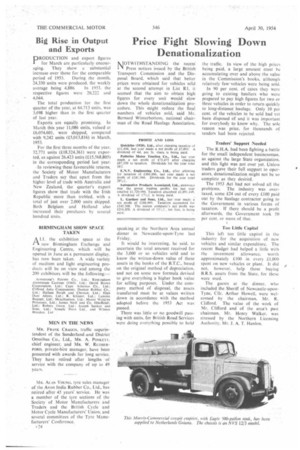Price Fight Slowing Down Denationalization
Page 74

If you've noticed an error in this article please click here to report it so we can fix it.
MOTW1THSTAN DING the recent
1 Press notices issued by the British Transport Commission and the Disposal Board, which said that better prices were obtained for vehicles sdld at the second attempt in List RI. it seemed that the aim to obtain high figures for every unit would slow down the whole denationalization procedure. This might reduce the final numbers of vehicles sold, said Mr. Bernard Winterbottom. national chairman of the Road Haulage Association.
speaking at the Northern Area annual dinner in Newcastle-upon-Tyne last Friday.
It would be interesting, he said. to ascertain the total amount received for the 3,000 or so vehicles sold and to know the written-down value of these assets in the books of the B.T.C., based on the original method of depreciation. and not on some new formula devised to give everything a higher book value for selling purposes. Under the company method of disposal, the assets transferred must be at values written down in accordance with the method adopted before the 1953 Act was passed.
There was little or no goodwill passing with units, for British Road Services were doing everything possible to hold the traffic. In view of the high prices being paid, a large amount must be accumulating over and above the value in the Commission's books, although relatively few vehicles were being sold.
In 90 per cent, of eases they were going to existing hauliers who were prepared to pay high figures for two or three vehicles in order to return quickly to long-distance haulage. Only 10 per cent. of the vehicles to be sold had yet been disposed of and it was important for everybody to know why. The sole reason was price, for thousands of tenders had been rejected.
Traders' Support Needed The R.H.A. had been fighting a battle for the small independent businessman. as against the large State organization, and this fight was not over yet. Unless traders gave their full support to operators, denationalization might not be so complete as they desired.
The 1953 Act had not solved all the problems. The industry was overtaxed. some .£24 out of every MO paid out by the haulage contractor going to the Government in various forms of taxation. If there should be a profit afterwards, the Government look 50 per cent. or more of that.
Too Little Capital This left too little capital in thc industry for the acquisition of new vehicles and similar expenditure. The recent Budget had helped a little with t he investment allowance. worth approximately £100 in every £1,000 spent on new vehicles or plant. Ii did not, however, help those buying B.R.S. assets from the State, for these were used.
The guests at the dinner, who included the Sheriff of Newcastle-uponTyne, ClIr. Arthur Howell, were welcomed by the chairman. Mr. R. Clifford. The value of the work of Mr. Clifford and of the area's past chairman. Mr. Henry Walker, was stressed by the Northern licensing Authority. Mr. J. A. T. Hanlon.




















































































































































































































































